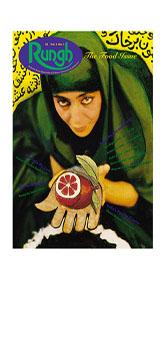
 |
 |
|
Date and Venue August 18, 2019 at 268 Keefer Street, #416, Vancouver Reviewer Christian Steckler |
||||||||||||||||||||||||||||||||||
|
This eye-opening afternoon of poetry was sponsored by Rungh, a publication focusing on peoples of colour, which questions and looks beyond identity politics. The readings provided a unique opportunity to explore connections in the memories, perceptions and experiences of poets of South Asian and Indigenous heritages. This novel idea resulted in a valuable and thought-provoking afternoon, spent in reflection of feelings not often faced, rarely spoken, and even more rarely understood by others. The presentation featured four poets, two of Indigenous background, and two of South Asian heritage. All are published writers. First up was Jessica Johns, of mixed Cree heritage, raised in Treaty 8 Territory in Northern Alberta. Her poems focused on her relationship with members of her family, and on questions arising from her move from life in her home territory, to a life in the unceded lands that comprise Greater Vancouver. In “How Not to Spill” she pays tribute to her parents. “Brother” tackled the challenge of choosing sobriety or not. “Will the Water Hear Me if I Call Them in Cree” addressed her presence in a new place, wondering if the land is narrowly connected to its people (as people are sometimes narrowly connected to their land). “Stubborn Blood”, a newer work, illustrated how history has not only shaped her, but is being shaped by her. Johns’s writing is clear and innocent in its approach, wondering and awed by its discoveries. The second poet was Sana Janjua, a poet and playwright of South Asian heritage. Her works, she admits, are heavily informed by her work as a psychiatric nurse. Her first reading, “Feelings”, speaks to deep and almost hopeless alienation. Through the lenses of different languages and cultural viewpoints, “The Pain of Separation” poignantly explores the idea of being missed, of the danger of never returning. Her poem “Mother” (translation) argues with a doctor’s citing neglect as a reason (read “cause”) for her mother’s illness. For this reviewer, this raised many questions about what constitutes neglect, and how family and culture define it, permit it, and deny it. “Birthday Blues” and “X” continued the bitterly observant nature of Ms. Janjua’s work, as did “Five Seconds”, which enumerated ways of demeaning. These readings were the most impassioned of the afternoon, dramatic in their presentation, heavy in emotion and content…and dark. Wanda J. Kehewin, of Cree heritage, uses her poetry to record her life for her children, so that her voice will be present when she is gone. She writes, also, to give her ancestors a voice. “Walk a Mile in My Moccasins” is a clear, graphic narrative about the reality of being “brown”. She provides simple wishes for basics for her daughters, that others take for granted in “Prayers for Our Daughters”. “Pretty and Pink with New Shoes” uses rain in a contemplation to contrast the “brown” life that she knows, of “life, love and buffalo bones given by dead relatives who want to be vindicated” with lives she sees around her - girls who are pretty and pink with new shoes. “Four Squares” tells memories of her helplessness in foster care, watching her brother being punished for infractions such as using more than four squares of toilet paper at a sitting. Kehewin’s writing is clean, clear, matter of fact and moving. She says things that need to be heard in reconciliation. Fauzia Rafique, novelist, poet and blogger, is of Pakistani heritage. Her poems, usually brief, demonstrate her values, and thereby, her identity. Ironically titled, “Good News” speaks to her grief in seeing a park destroyed for the sake of a condo development - good news only for some. Her second and third pieces, “Sharia Compliant Bra” and “Lose Some Sleep” lament the waste of government time and resources over trivialities and meaningless pursuits - the first in Pakistan’s legislation about bras, and the second in Canada’s (Harper) Bill C51. “This Thanksgiving” and “Alone” express Rafique’s wish to be recognized as the unique person that she is. “Discover me like Columbus discovered America,” she says in the first of these. She, alone, understands that qualities in herself outshine what is conventionally thought to be dazzlingly important. Rafique’s writing is direct. Feeling and idea master imagery in her style. The result is sometimes ironic and humorous, always pleasing. This was a well-spent afternoon. More such events, more widely publicized, need to take place. Rich talents roam among us. © 2019 Christian Steckler |
||||||||||||||||||||||||||||||||||||
|
|
||||||||||||||||||||||||||||||||||||
|
|
||||||||||||||||||||||||||||||||||||